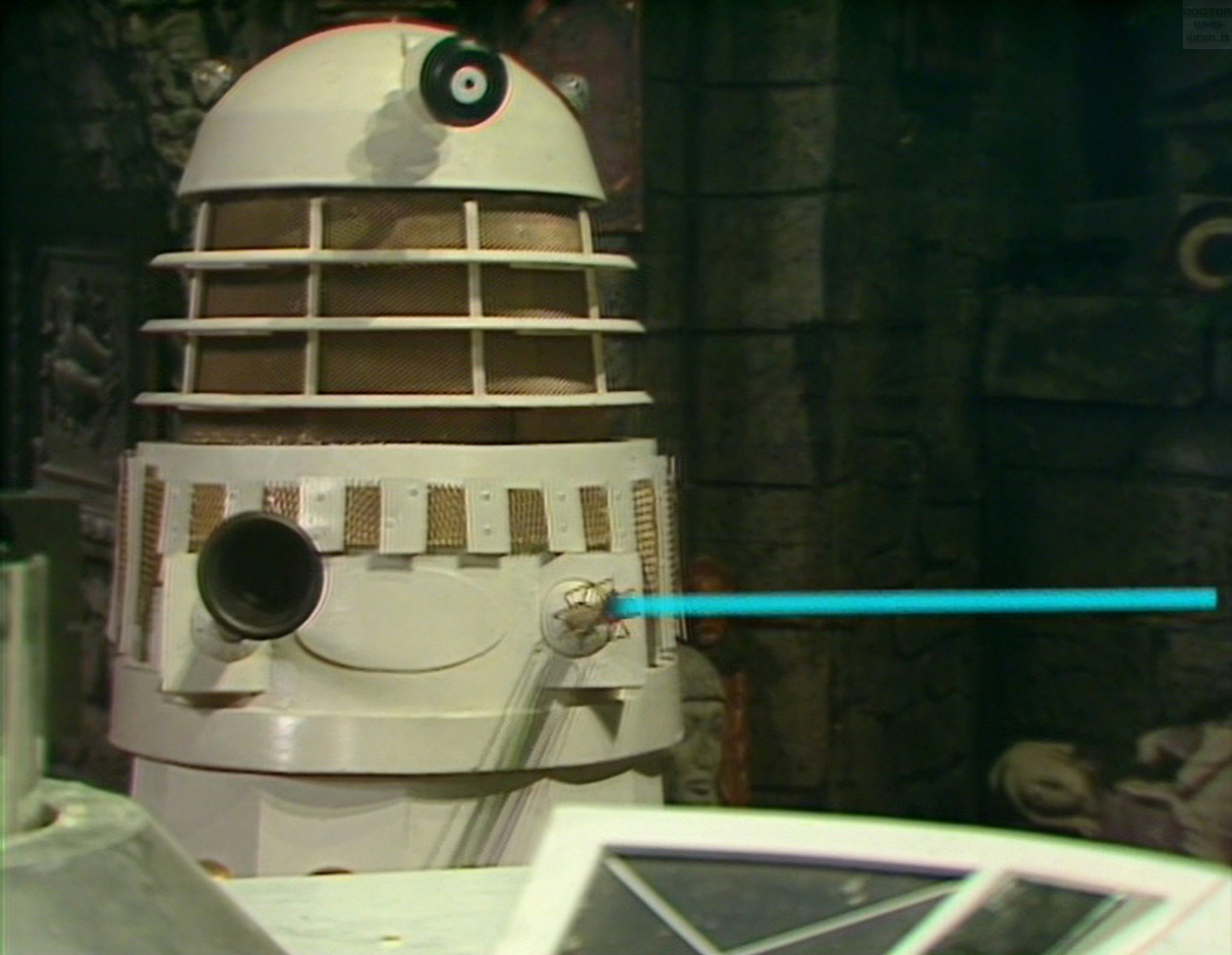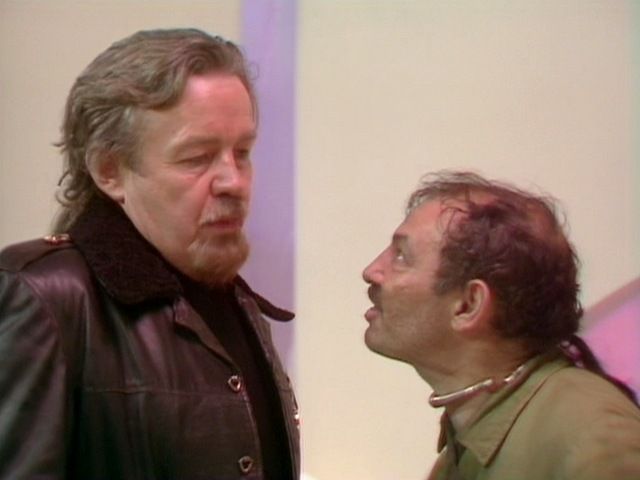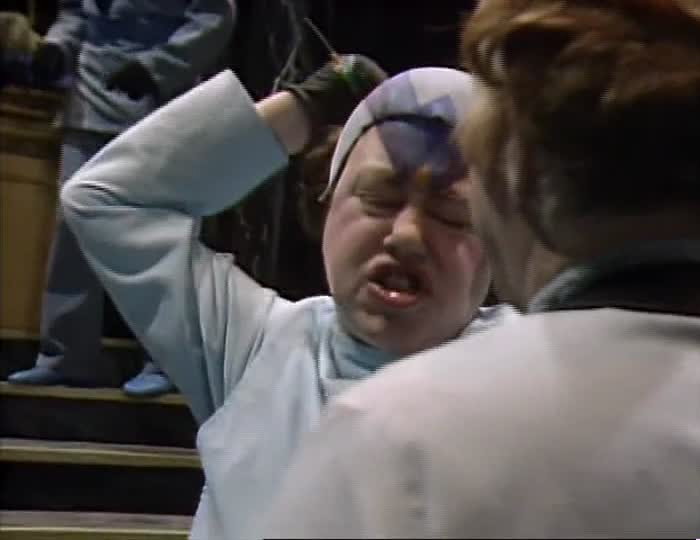‘Revelation of the Daleks’ is one of the most highly-regarded adventures of the Sixth Doctor’s era. What is the secret to its ongoing appeal?

For a start, it’s worth mentioning that ‘Revelation of the Daleks’ was penned by one of 80s Who‘s most popular writers Eric Saward. Saward joined the programme during Peter Davison’s first season as script editor, and had previously written the explosive ‘Earthshock’ which re-introduced the Cybermen and killed off one of the companions.
Saward’s overall style, therefore, pushed Doctor Who‘s boundaries in a way that hadn’t previously been seen. The writer himself admitted that he was keen to “release the handbrake” on violence, and he wanted it to be portrayed in a realistic way – to demonstrate that there were visible consequences to the actions that were taken.
And this was certainly true when it came to 1985’s ‘Revelation of the Daleks.’ Arguably, this is the most ‘adult’ and gritty a Doctor Who story had ever been, with the possible exceptions of ‘Vengeance on Varos’ and the 1996 TV movie. And in some ways, this was entirely appropriate. The Daleks, after all, were designed as the perfect killing machines and were blinded by such a visceral xenophobia that they genuinely believed that any differing life form should be wiped from the face of the universe.

And so for Eric Saward to tell a story that reflected such dark motivations made sense, and this may go some way to explaining the appeal of ‘Revelation of the Daleks.’ Here, the metallic mutants are not made light of or ‘sent up’ in the way that they had been in previous adventures like ‘The Chase’ or ‘Destiny of the Daleks.’ They are designed to kill, and their demented leader Davros is hell bent on furthering their murderous cause.
But Eric Saward took this idea one step further in ‘Revelation of the Daleks,’ highlighting what is an inevitable outcome of such a blinkered worldview; eventually, the Daleks turn on each other, and ‘Revelation of the Daleks’ marks the beginning of the Dalek civil war which continues in 1988’s ‘Remembrance of the Daleks.’ From this point on, the metallic mutants are split into two warring factions: Renegade Daleks, who are loyal to the Dalek Emperor, and Imperial Daleks, who are loyal to Davros.
And in coming up with this idea, Saward was very much driven by his dissatisfaction with his previous Dalek endeavour ‘Resurrection of the Daleks.’ Speaking on the story’s DVD commentary, the writer felt that ‘Resurrection’ was too frantic with too many competing ideas, and he wanted to put these ‘mistakes’ right in the following season.
That’s not to say that there aren’t a large number of ideas at play in ‘Revelation of the Daleks.’ But the story is aided by a gentler pace, comprising of two, 45 minute episodes as opposed to four, 25 minute episodes. And although there is a large cast of characters in the mix, one could argue that they are have more ‘breathing space’ because of the longer episode format.
And what of these characters? They are certainly a large part of the story’s appeal, and it is clear that Eric Saward was influenced by the work of his friend (and fellow Doctor Who writer) Robert Holmes, who had a penchant for putting mildly comedic ‘double acts’ into his scripts. Indeed, these are clearly in evidence in ‘Revelation of the Daleks’ with Kara and Vogel, and Jobel and Tasambeker, and Takis and Lilt, and Natasha and Grigory, and the Doctor and Peri.
And then there is the story’s (potentially) most famous double act, Orcini and Bostock. Orcini is an assassin from the Grand Order of Oberon who has been hired by Kara to dispense with Davros who, unexpectedly, has taken over the food production at a funeral parlour known as Tranquil Repose. And being killers, it goes without saying that they aren’t the most comedic double act in ‘Revelation of the Daleks,’ but they certainly have entertaining patter, driven by Orcini’s cool and philosophical outlook.

(C) BBC
Indeed, Orcini breaks the mould when it comes to assassins, taking an unusually philanthropic approach to his murderous acts. “I take little joy from my work,” he says in his first scene. “That I leave to Bostock. I prefer the contemplative life. It isn’t always easy to find, so, to cleanse my conscience, I give what fee I receive to charity.”
But Eric Saward wasn’t just inspired by Robert Holmes’ love for double acts. According to writer Terrance Dicks, Holmes took the view that “original ideas are fine, but they don’t have to be your original idea.” That is not to say that he believed in outright plagiarism; rather, he recognised that it was okay to draw inspiration from other source material.
And this is something that Eric Saward has openly discussed when it comes to ‘Revelation of the Daleks.’ On the story’s DVD release, he explained that he was inspired by a 1948 novel The Loved One by Evelyn Waugh, which revolved around a funeral parlour in Los Angeles. Obviously, the novel had a distinct lack of Dalek civil wars and assassins from Oberon, but what did inspire Saward were the characters and their relationships with one another.
Indeed, in The Loved One, the character of Thanatogenos wrestles with her attraction to the chief mortician Mr Joyboy, a situation which is mirrored in the unrequited love between Tasambeker and Mr Jobel in ‘Revelation of the Daleks.’ But in the Doctor Who version, things take a rather dark turn as Tasambeker – deeply hurt by Jobel’s rejection – resorts to stabbing him with a syringe after being egged on by Davros.

Arguably, this is about as violent as Classic Who ever got, and in fact this was the last story of this ilk to be transmitted before the programme went on a sudden hiatus. When it returned 18 months later, the tone had been significantly dialled down.
But was ‘Revelation of the Daleks’s distinctly adult ‘mood’ at the heart of its success? Perhaps not exclusively, but it certainly appealed to the swathes of adult fans who continue to enjoy this story today. It was a violent adventure, but there is no denying that it was realistic violence with realistic consequences, and this had been writer Eric Saward’s intention from the get-go.
But over to you, reader. What do you enjoy most about ‘Revelation of the Daleks’? And why do you think it has endured for so long? Let me know in the comments below.








It is just so violent and unrelenting with the only ‘good’ and untainted characters being Peri and The Doctor (and maybe the DJ). We have the death of a mutant and needless ones of the harmless DJ and silent secretary, a syringe stabbing, sword stabbing, fingers and legs being blown off, the descent of a father in a ‘glass’ Dalek, an alcoholic medic and the imperial (grey) Daleks are so efficient, sweeping in and capturing Davros in minutes. Not comfort viewing!